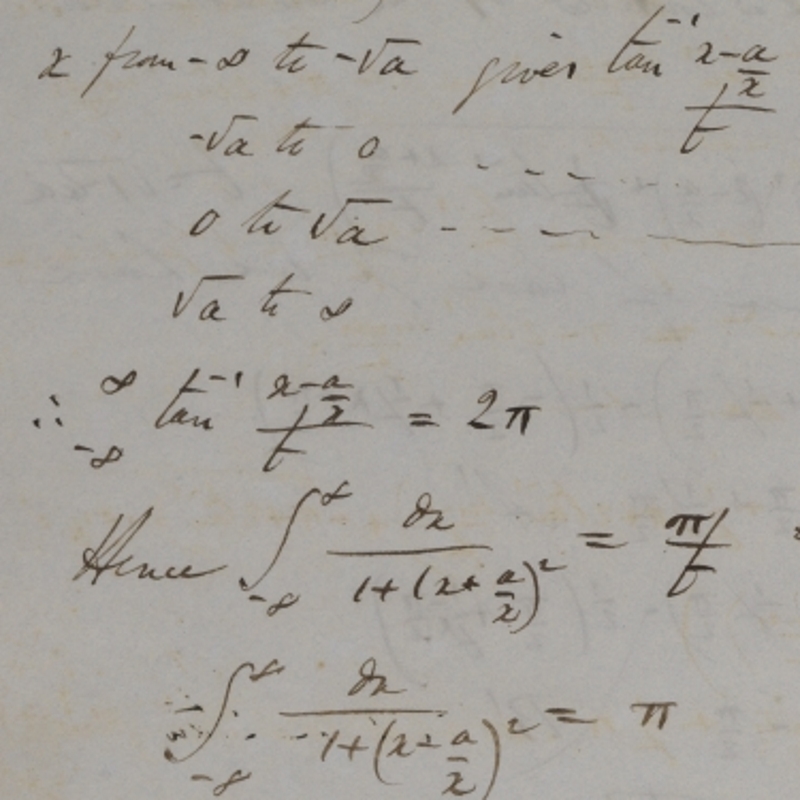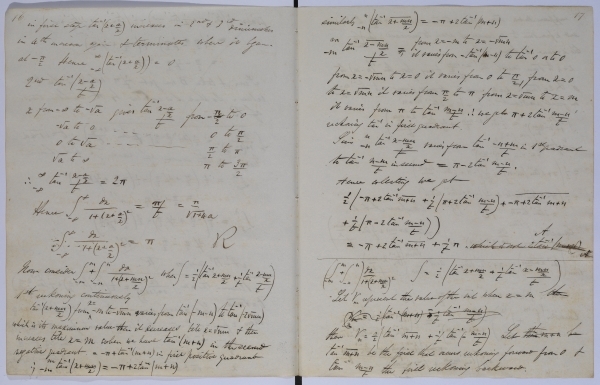Louisiane Ferlier gives an overview of the major mathematical works at the core of the Royal Society's collections, with key names including Euclid, Newton, Bayes and Boole.

The formation of a collection including mathematical books, instruments and manuscripts was integral to the foundation of the Royal Society in 1660. In the words of a contemporary proposal:
‘Further more let there be every yeare a summe of money laid aside out of the Society’s stocke to be laid out at the discretion of the Council in books whose cheife scope is naturall Philosophy or mathematicks for the use of the Society’.
The importance of mathematics is reaffirmed systematically through the history of the Royal Society library, and whereas some subjects were deaccessioned following the evolution of scientific practices, mathematics remains at the core of our collections today, signifying powerfully the mathematisation of science.
It would be impossible to propose an exhaustive list of the mathematical treasures contained in the Royal Society collections: they are both too numerous and too scattered between the book collections, the institutional papers, the correspondence and personal papers of Fellows of the Royal Society. Instead, I would like to give a taste of our holdings and encourage you to visit our collections to discover much more.
The library holds fundamental publications on the history of mathematics and from the mathematical canon. We have several early modern editions of Euclid’s Elements of Geometry, and we’ll soon be participating in a national Euclid exhibition in partnership with the Oxford-based Reading Euclid project. We also hold various editions of Joseph-Louis Lagrange’s work on functions, some including fascinating marginal annotations by Fellows of the Royal Society and benefactors. The 1832 Hungarian textbook Tentamen by Farkas Bolyai and his son János, of which there are few extent copies, is another prime example of the rare mathematical books in the collection.
As publisher of Isaac Newton’s Principia Mathematica, the Royal Society holds the fair manuscript copy sent to the printer and dozens of editions of the printed work, as well as relevant correspondence and notes by contemporary mathematicians such as David Gregory and John Wallis.
The symbolic algebraist George Peacock (1791-1858) was a very active contributor to the Royal Society, helping with the publication of a catalogue of its Library in the 1830s and acting as referee, communicator and author for the mathematical content of the Society’s periodical Philosophical Transactions A. Peacock’s reports, and those of other 19th century referees, make for a fascinating read, unveiling the beginnings of peer review and featuring discussions of key mathematical discoveries by contemporary scientists. We also hold correspondence, papers and portraits of various key mathematicians, from Thomas Bayes to Ronald Fisher (here's our digital exhibit), plus the recently catalogued papers of Maurice Bartlett.

George Boole: MS/782 notebook 26 p.16 © The Royal Society
I would like to close with another treasure and a favourite of mine: MS/782, the collection of the mathematical and scientific papers of George Boole (1815-1864). Formed of 13 boxes, the collection was deposited in 1866 and completes the Boole papers kept at University College Cork.
The application of Boole’s algebraic method to digital circuits demonstrates how theoretical mathematics can lead to unexpected practical applications. This wonderful legacy of Boolean algebra is a reminder that the mathematical canon can still be a fruitful and relevant source of inspiration for scientists today.
A version of this blogpost was published in the Newsletter of the London Mathematical Society.

